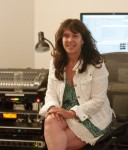As a kid, Nancy Richardson would use a bag of ice to cool off her television before her strict, anti-TV mother could check and feel the warm screen. Only once, when Richardson was home sick, the pair watched “Citizen Kane,” and Richardson knew she wanted to work in film.
Richardson, an alumna of the UCLA School of Theater, Film, and Television, currently pursues her passion for film as a tenured professor in post-production at the film school. In addition to her work in academia, she is also a full-time film editor. She has worked on 29 films, including “Twilight,” “Warm Bodies” and “The Vow.” Most recently, her work has taken her to the MGM and Screen Gems’ remake of “Carrie.”
Richardson originally intended to be a writer and director. She had some initial luck with screenwriting, but she said she was unhappy. While some of her scripts got picked up, none of them were getting made. But in 1986, some friends from UCLA decided to make the film “Stand and Deliver,” and asked Richardson to become the film editor. She said the more concrete nature of editing lead her to pursue the career path.
“I thoroughly enjoy (editing) far more than I ever did screenwriting,” Richardson said. “It’s a lot more tangible, and you feel that you are actually making the film. You are actually putting it together and shaping it to a place where it will work as a movie.”
Michael Sucsy, the director of “The Vow,” said he believes Richardson has a great talent for editing. He said her greatest strength lies in her ability to express her opinion and to celebrate the nuances of the scenes and actors.
“The thing that I loved was that she embraced the actors’ quirks rather than trying to scrub them out of the performance, and it made it more real,” Sucsy said. “(Richardson) wasn’t afraid to push back with me and work to come up with the best idea. I really valued her opinion.”
Richardson said her process in editing a scene starts with listening to the director’s vision. Relying on empathy, she said she aims to cut and shape the raw footage to capture genuine moments. She said she got lucky with Channing Tatum and Jenna Dewan-Tatum in “Step Up” when the pair actually fell in love.
“It’s almost like you’re bodysurfing and you catch a wave and you take that ride through,” Richardson said. “Most of the films I’ve worked on, I’ve managed to really connect with the material. … I’ve worked on all these movies where the actors actually fall in love, and you can see that in the (footage).”
Sucsy said Richardson’s aptitude for understanding the material is a product of her natural talent and her instincts. He said they give her the edge she needs to feel out the rhythm of a scene.
“Like a good dancer, (Richardson) is feeling the rhythm, not thinking about it, and you can see that in her work,” Sucsy said.
Richardson’s repertoire of films in all genres and budgets speaks to her professional success. Fabian Wagmister, the vice chair of the directing and production program, said Richardson, likewise, goes above expectation in the academic environment as well.
“Working with Nancy is intense because she is so passionate about what she does,” Wagmister said. “Any dialogue with Nancy is stimulating because it’s always about the answers of why we do the things we do; it’s never superficial. This is the kind of energy our students need.”
While the dual careers pose a massive time commitment, Richardson said she can’t choose between the two. In spending time in the classroom, she said she takes the energy she sees in her students back to what she does in the editing room.
“I really get a lot out of my film students at UCLA. They’re young, they’re passionate and they have these dreams and goals,” Richardson said. “They may be a little naïve, but they’re certainly not jaded. It helps keep my work more alive, and teaching has kept me fresh.”
Richardson said her work with film, professionally and academically, is a labor of love. She said she believes that good films all have soul – even seemingly shallow movies have take away messages about fun and humanity. She tells her students the best thing they can do is to make soulful films.
“Film, at its essence, reflects the souls of the filmmakers,” Richardson said. “I like to tell my students to develop their souls, because they can’t put anything more in the movie than they have in the depths of their souls, and I think you can absolutely develop your soul in your everyday behavior.”
